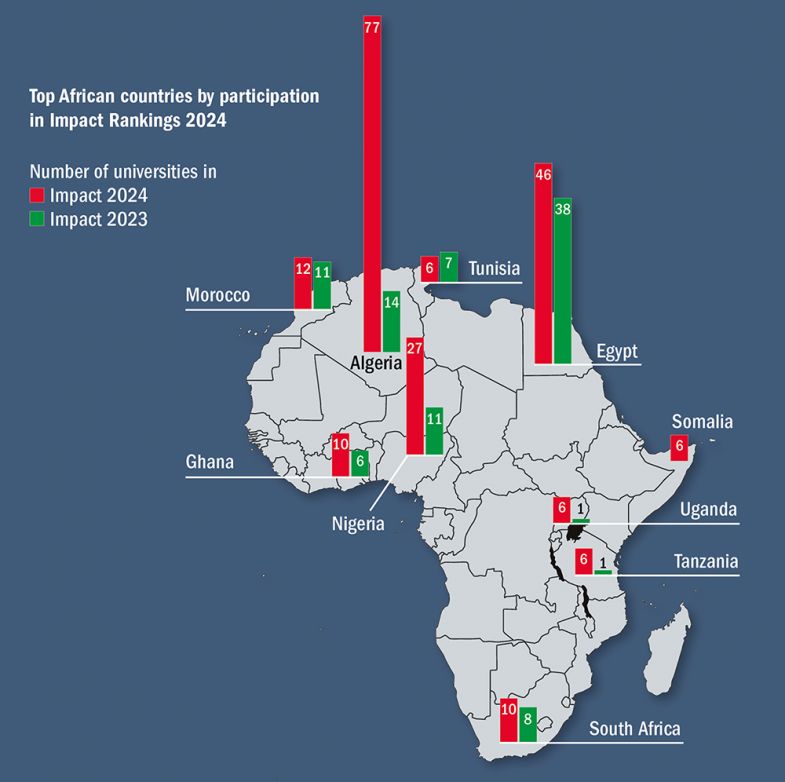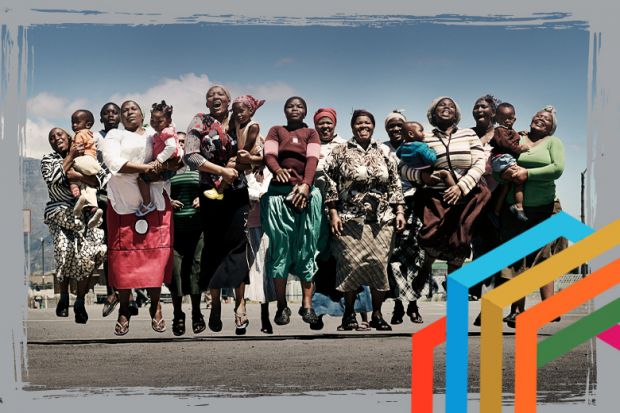Browse the full results of the Impact Rankings 2024
Participate in next year’s Impact Rankings
Increasing numbers of African universities are focusing on the United Nations’ Sustainable Development Goals (SDGs), with those featuring in Times Higher Education’s Impact Rankings more than doubling in the space of a year.
The continent now has 230 universities ranked across the 18 Impact tables, which assess universities against the SDGs, up from 106 in 2023.
The growth was led by two countries: Algeria, which now has 77 institutions, up from 14 last year; and Nigeria, which has 27, up from 11.
Impact Rankings 2024: results announced
The performance of universities in the continent has also improved.
Universities in South Africa have historically achieved the highest scores, but for the second consecutive year an African institution outside the economic and research powerhouse tops an SDG table.
Afe Babalola University in Nigeria, a private institution, climbs up the top 10 to rank first for SDG 7 (affordable and clean energy) this year. While the institution receives lower scores than its peers for bibliometrics relating to research in this area, it achieves top marks for the six indicators relating to university measures towards affordable and clean energy, the indicator on the energy use of its buildings, and the five indicators relating to community outreach work on energy.
Africa rising: participation across continent doubles

Five other African universities feature in the top 20 for SDG 7, all of them in Egypt.
The vast majority of the 230 African universities participating in the rankings submitted data on SDG 17 (partnerships for the goals) – the only mandatory goal for inclusion in the overall ranking.
After that, SDGs 4 (quality education), 3 (good health and well-being) and 5 (gender equality) were the most popular for the continent, in line with the global trend.
The majority of African universities (59 per cent) also submitted data on SDG 1 (no poverty), above the global average of 49 per cent. South Africa is the top-performing country in the world for this SDG, on average, based on nations with at least five ranked universities.
Three African institutions make the top 15 for SDG 1 this year: the University of Johannesburg is third (down from first last year), while the University of Pretoria debuts at eighth and Afe Babalola University is joint 15th.
Top African universities in the overall Impact Rankings 2024
|
Rank |
Institution |
Country |
|
=36 |
South Africa |
|
|
42 |
South Africa |
|
|
=77 |
South Africa |
|
|
101–200 |
Nigeria |
|
|
101–200 |
Ghana |
|
|
101–200 |
Tunisia |
|
|
201–300 |
Egypt |
|
|
201–300 |
Egypt |
|
|
201–300 |
South Africa |
|
|
301–400 |
Egypt |
|
|
301–400 |
Egypt |
All three universities receive top scores for indicators relating to their own anti-poverty programmes, such as support for students from the poorest families.
The least popular SDG for the African continent is 14 (life below water), with less than a quarter of participating institutions submitting data in this area, followed by SDGs 12 (responsible consumption and production) and 15 (life on land).
The top African university in the overall Impact Rankings, which scores institutions based on their performance in SDG 17 and their best three results on the remaining 16 SDGs, is the University of Johannesburg, at joint 36th. Two other South African institutions – the universities of Pretoria and Cape Town – follow in the top 100.





